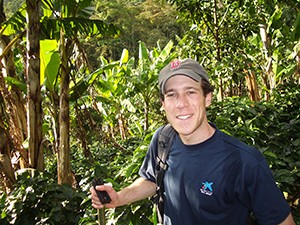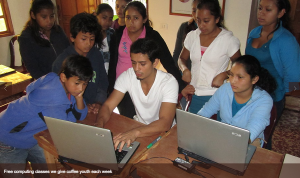https://www.youtube.com/watch?v=tgT9OuooPhY&feature=youtu.be
Available by the cup and the pound across campus, the new Wash U Blend is a coffee from Nicaragua. Specifically from the region of Matagalpa. Specifically the mountain farm of Don Roger Mairena.
“It’s one of the most beautiful farms I’ve ever seen,” said Tyler Zimmer, co-owner of Kaldi’s Coffee Roasting Co., which supplies coffee to Washington University in St. Louis. “Don Roger does all of the small steps to make a great product. The result is a welcoming, comforting coffee — well-balanced, chocolatey and easy-drinking.”
Mairena and more than 30 other specialty growers sell their beans through Gold Mountain Coffee Growers, a social enterprise founded by Washington University alum Ben Weiner. Gold Mountain secures better prices for farmers and reinvests profits into the community, providing farmers and their families access to credit, computer classes, school supplies and other services.
“People wonder why coffee costs so much in the U.S. Even today most coffee producers across the world receive pennies, at most, for each cup people drink,” said Weiner, who graduated in 2003 with a degree in political science in Arts & Sciences. “If you are a producer in Nicaragua, you likely have plastic sheeting on your house. You have about a 30-percent chance of having electricity. You don’t have a vehicle. You have no access to credit. And you’ve probably been cheated by buyers.”
Weiner wanted to develop a new model — one that simultaneously improved the quality of coffee and the lives of the families who produce it. The social enterprise he founded is fair, but not “fair trade.”

“In terms of quality, it’s been a race to the top rather than a race to the bottom, which is sometimes the case with fair-trade coffees,” Weiner said. “Fair-trade coffees are usually lumped together, regardless of quality. What we do is separate and test all of the farmers’ coffees the day they are picked. That way vendors know exactly what they are getting. They value the enhanced coffee quality that results from quality control and traceability.”
Gold Mountain grew out of Weiner’s senior honors thesis about Nicaraguan debt relief. He made several trips to Nicaragua, immersing himself in the people, the politics, the environment, the culture. In other words, he immersed himself in coffee, the lifeblood of the Nicaraguan economy. Gold Mountain now operates its own farm, Finca Idealista, and continues to build relationships with other small family farms, a challenge in a nation with notoriously poor infrastructure.
“You need a vehicle with more than a four-wheel drive to get to some of these farms and, in some cases, you need to stop where the four-wheel drive vehicle can’t go and then walk or get on a donkey,” Weiner said.
Kaldi’s was Gold Mountain’s first customer. Zimmer, who travels to farms across the globe, said Weiner’s approach is both transparent and sustainable.

“We all want to pay the growers more money but the quality has to be there,” Zimmer said. “Ben understood that from the very beginning. He was there, getting his hands dirty, trying to improve and innovate. At the end of the day, the consumer has to pay more for the product and, for that to happen, it has to deliver.”
Weiner himself is a big coffee drinker, and loves discovering new profiles. So much can influence a coffee’s taste — soil, fertilizer, cherry ripeness, pruning methods, how long the beans take to dry.
“What makes me happy is tasting 20 or 30 of our coffees at the same time and knowing each one is awesome,” said Weiner, who drinks his coffee black. “Some of them have tropical fruit cupping notes; some have notes of brown sugar or strawberry pie or chocolate. Each one is totally different.”
Gold Mountain is not Weiner’s sole endeavor. He also serves as advocacy counsel at Human Rights First, an advocacy organization devoted to protecting human rights here and abroad. Previously, Weiner worked as foreign policy legislative assistant to U.S. Senator Sheldon Whitehouse of Rhode Island.
Weiner lives in Washington, D.C., but travels frequently to Nicaragua. He has seen the lives of his producers change in big ways. Mairena, for instance, has installed a water filtration system.
“Some of our producers have purchased solar panels, new houses or have improved roads on their farms. Some send their kids to school for longer and better equipped,” Weiner said. “They now can make their own decisions about how to best improve their product and their lives.”
To learn more. visit goldmountaincoffeegrowers.com and follow @goldmtncoffee on Twitter.